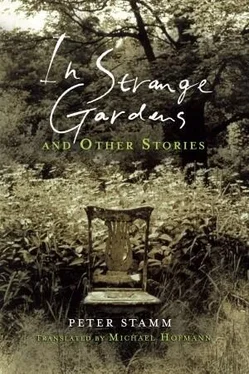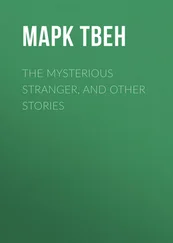“I’m walking in the garden. I hear the tune, it doesn’t stop. I know the tune, but not the resolution. I’m looking for it in the garden. Then my father finds me. He takes my coat away. And when I wake up, I can’t find it anywhere.”
Emily sat down beside me on the sofa. She leaned over her violin, which she held cradled in her arms like a child. Her head was to one side, as if she were trying to listen to some distant sound. I asked her whether she hadn’t ever thought of leaving here. She slowly shook her head and said: “I have already taken off my dress, how can I possibly put it on again?”
She put her violin away with a gesture of impatience, and said: “Anyway, where would we go?”
I asked her whether she would show me her paintings. She shook her head.
“When you come back,” she said.
I said I was going now.
“I won’t see you out,” she said, and got up with me. I thought she wanted to kiss me on the cheek, but instead she whispered something in my ear, and pushed me out the door. As I walked through the house, I heard Emily begin to play again, the same sad melody she had played last night and this morning, and that I still couldn’t identify.
I left the house, and walked through the garden. Gwen was nowhere to be seen. The gate was locked. I scrambled over the wall, and was relieved to be standing out on the street. I didn’t want to wait for a bus, and set off down the hill. Earlier on, the sky had been overcast, now a fresh wind was blowing an ever darkening succession of clouds across the sky. The trees beside the road were moving violently, as though trying to tear loose from the earth. In the east, it looked like rain. I had almost reached the foot of the hill, when an old white Mercedes approached. It drew up alongside me. Dr. Kennedy leaned across the front passenger seat, and wound down the window.
“Are you going already?” he asked. “Who let you out?”
He said I could perfectly well stay as long as I liked. I said I didn’t have anything with me, all my things were back at the B and B. He said he would drive me there, we could pick up my things, and be back here in no time. He opened the door, and I got in.
On the way into town, it started raining. I asked Dr. Kennedy about the grave in his garden. He said he didn’t know who was buried there. He had bought the property thirty years ago. They had come across the stone in the course of building work. He said the dead were of no interest to him. Then he asked me which of his daughters I liked best. I said they were all three beautiful.
“Yes, they’re beautiful all right,” he said, “but now you have to make up your mind. We will all be very happy.”
We drove through an area of ugly tenement blocks. Children were playing by the roadside, and a couple of men standing with cans of beer outside a fish truck turned to stare at us. I asked the doctor whether this was a Catholic or Protestant part of town. That didn’t matter, he said, misery was the same everywhere. Like happiness, indeed. He said he found it all repulsive. I asked him whether he had never considered moving away. He said he had built a wall around his house. And he took note of who came into his garden. He asked me who had let me out, and looked at me.
“I climbed over the wall,” I said.
The doctor’s face became expressionless. He looked tired. He didn’t say anything, and watched the road again. He stopped outside the B and B and said he would wait for me in the car.
I went to my room, and packed my things. I thought of all that I had seen and all that I might yet see. I looked out the window. The white Mercedes was parked outside. The rain had stopped, and the doctor had gotten out, and was pacing back and forth on the pavement. He was smoking a cigarette and seemed nervous.
I had packed everything, but I didn’t go downstairs. I stayed by the window, looking down. The doctor walked back and forth. He dropped a butt in the gutter, and lit himself another cigarette. Once, he looked up at me, but he couldn’t have seen me through the curtains. He waited probably half an hour, then he got into the old Mercedes and drove off.
I thought of the evening I had first met Dr. Kennedy. After he had gone, I sat on at my table. I drank my beer, and waited, I don’t know what for. Then a tune surfaced through the noise. One of the musicians had begun to play, and gradually the others fell in. The conversations at the tables grew quieter, and finally stopped altogether.
The music was at once sad and cheerful, melancholy and rousing and full of strength. It filled the room, and didn’t stop. The younger players, children some of them, gradually packed away their instruments and went away, but the rest carried on playing, and others came along and filled in the gaps in the circle. When the drummer left, he handed Terry his drum, and now Terry was playing along with them too, hesitantly at first, then with a growing confidence. Among the musicians I remembered the old man who had coached the children in their singing the day before. He was playing the fiddle. He looked very serious.
I stood by the window of the pension, and looked out. The clouds passed swiftly across the sky, continually changing their shape. They were moving from east to west, crossing the island, and moving out to the Atlantic. I stood there for a long time, thinking about the music and the old man and what he had said to the children. You have to ask the question, and give the answer. It’s one and the same thing.
I met Chris on a basketball court, way uptown in Manhattan. Guys from the neighborhood met up to play there, and you could turn up when you liked, and play till you were tired. Chris was the only white guy I ever saw there. Whenever he was playing he wanted proper teams, and he kept score, and he objected when someone held the ball too long.
When I got tired, I would sit in the shade of some trees at the edge of the court, and watch the others. One time, Chris sat down alongside me, and asked if I lived locally. We talked for a while and got along pretty well, and when I told him I was looking for a room he suggested I move in with him. He had just split up with his girlfriend, he said, and was looking for a subtenant.
We shared the apartment for a little while, without seeing much of one another. Then Chris fell in love at a college party. He told me all about it that same night. I had already been asleep. It was past midnight when he woke me.
“I’ve fallen in love,” he said.
“That’s nice for you,” I said, “now can I go back to sleeping, please.”
“She’s an Indian girl called Yotslana. She had the most amazing jet-black hair you can imagine. And her eyes …”
The following evening, we talked about women and love. Chris was raving about his Yotslana, and maybe because it was getting on my nerves, I argued that true love could never be physical. The physical corrupted everything, it opened your eyes, and destroyed any ideal, spiritual love.
“I think you should keep your one great love unconsummated,” I said. “It doesn’t matter if you have other relationships on the side, it doesn’t even matter if you live with another woman.”
Chris listened silently. For the next few weeks, he was thoughtful. He stopped talking about Yotslana. He met her from time to time, and after those meetings he would get home late. When fall came around, I moved to Chicago. Chris helped me pack my things, and drove me to the station.
“How’s your Indian girl?” I asked.
“We’re in love. She’s moving in. She’s quarreled with her parents, and of course your room’s vacant.”
“Good luck,” I said, and promised to visit in the spring.
In Chicago, I found myself living with a young couple in a big apartment on the South Side. She was a dancer, he was a photographer. He was Brazilian, and the two of them had married so that he could remain in the country. He was gay, the dancer explained my first evening there,but they were very devoted to each other, maybe more than most couples, because they didn’t expect anything of one another. Sometimes he would come to her bed on Sunday mornings, and then he would be like a child.
Читать дальше












